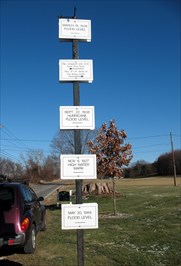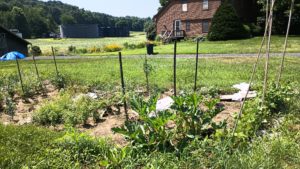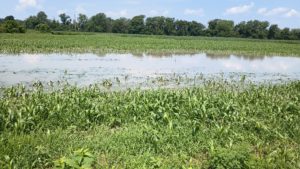On the day after Hurricane Irene, I woke up and looked out my window and saw that the river had completely covered the fields across the street from my house. As the water lapped at the edge of the road, I wondered if I’d be trapped. We are on high ground, but our only way out is Route 47 North or South unless we want to walk across the Mt. Holyoke Range, or get hold of a canoe. Many of our neighbors have showed us pictures of their families escaping on boats during the historical floods of 1936 and 1938, which are commemorated by the flood marker I pass every day, about a mile north of my house.
The flooding from Irene never got to the road, thanks to the Hadley DPW trucks and their well placed distribution of sandbags, but I did lose my entire garden, which had been in one of the fields by the river. A truly sad day, even though the tomatoes were pretty much done and we’d already enjoyed several months of the harvest.
My garden is now on higher ground 
closer to the house, and the flooding on the river plain in my neighborhood has been far less than we anticipated this time. When I look across the street I see deep pools, similar to what’s common in the spring, where people sometimes stand on the road and fish, though some of the corn is clearly lost.
However many farms in the area including two that I feel personally connected to: Grow Food Northampton, Mountain View Farm and Stone Soup Farm lost nearly all of their crops. And north of us in Vermont, the situation is much worse, with many homes and businesses devastated.
I often find myself pondering what I would do in face of tragedy, especially the sudden, unexpected kind that threatens the foundations on which I live my life: family, home, sustenance, livelihood. And the thought brings me right back to the week I spent in Matamoros on the Mexican border, walking past wet and sagging tents perched in the hot, muddy field, talking to people who lost everything when tragedy forced them to leave their home countries, people whose only remaining possession is hope.
My husband (who’s always been more attached to food than I am) still occasionally grumbles about the burgeoning crop of sesame seeds we lost in the Irene flood, which we’ve never been able to successfully reproduce. But in reality it was no big deal to lose my garden that summer. I’ve led an exceptionally privileged life whose tragedies, while still difficult, are expected outcomes in the cycle of life and death that all of us on the planet endure. And while sometimes acknowledging that privilege makes me edgy, it also reminds me of my responsibility to participate in tikkun olam, the healing of the world, and to feel gratitude for all that I have.
The farmers at Mountain View write, “We are going to take things one step at a time as we plan for how to proceed. We will continue to distribute farm shares with our heads held high for as long as we can with what we have left.” This seems in line with the mindset of many of the people I spoke with on the border. Despite how bleak their situation appeared, they kept pressing on, determined to get through each day and take one step closer to their dreams, no matter how unachievable they might seem.
Good advice–for all of us, no matter what our state of privilege/challenge might be and no matter how essential our goal(s) might be to our ability to survive. That, along with my meditation app’s suggestion of 10 deep breaths, a reset, and a step forward.
To subscribe to this blog, sign up at ddinafriedman.substack.com
